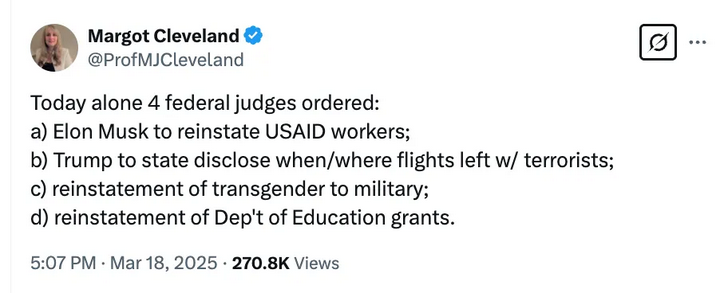As many folks on Twit-, er, I mean X have pointed out, Mark Carney is just a caretaker PM, not having ever been elected to the position, so it’s more than a bit breathtaking that he’s making announcements like this without any mandate from the voters:
The last Liberal leader promised real change too. Apparently this one uses a different definition.
“It is clear that the United States is no longer a reliable partner,” Mark Carney said after a cabinet meeting on Thursday. “It is possible that with comprehensive negotiations we will be able to restore some trust. But there will be no turning back.”
Uh, sir, you’re sounding kind of categorical —
“The next government — and all that follow — will have a fundamentally different relationship with the United States,” Carney said.
So if I understand correctly, what you’re saying is —
“Coming to terms with this sobering reality is the first step in taking necessary actions to defend our nation,” Carney said. “But it’s only the first step.”
In a career that now stretches back to before many of my readers were born, I’ve covered speeches like this before, of course. Maybe five. Well, two. No, strike that, this was new.
“Over the coming weeks, months, and years we must fundamentally reimagine our economy,” the rookie leader of the Liberal Party of Canada said.
Well, you know, “fundamentally” can mean a lot of things —
“The old relationship we had with the United States, based on deepening integration of our economies and tight security and military cooperation is over.”
Oh, so you mean fundamentally.
In French, a language that fits this Savile Row man like a hand-carved barrel — it covers the essentials while leaving the odd splinter — Carney did a version of the Doug Ford thing where he asked for a strong mandate to undertake negotiations. Unlike Ford he put no real effort into selling it. Was he being overconfident? Not at all, he said, as every man ever has in response to that question. He still needs to “win every vote,” he insisted.
But it “would be better” to have a large mandate “to have a large, comprehensive negotiation, the most important in our life.” Here he didn’t pause, really, so much as consider the ramifications of what he was saying while the words were still coming out.
“Especially in my life. When I was born the Auto Pact was created.” Which sounds grandiose, sure, but to be fair I believe Carney, who was born in Fort Smith in 1965, was merely asserting correlation, not causality. “And now it’s over.”
Wait, what? The AUTO PACT is over? That’s like saying it’s time to shut the ski operation at Whistler down, if Whistler contributed 11.5% to Canada’s manufacturing GDP. “It’s very serious, this situation,” he concluded, mildly.
Later, some of the early reaction to Carney’s remarks seemed to me to skip too lightly over the plain meaning of the Prime Minister’s words. And yes, it feels odd to call him the Prime Minister. We haven’t yet had a vote on the matter, although I’m told one will be held shortly. But the people in the cabinet room were people Carney had appointed, and the Parliamentary Protective Service let them in, so I guess in a rough-and-ready way, he really is — Anyway. It’s possible Carney’s words meant nothing. Or that he’ll be forced to eat them later. Or that, it being election season, he’ll never get a chance to implement them. In the latter case, the Carney Tariff Scrum of March 2025 would become an item of wonk trivia, like Kim Campbell’s genuinely impressive government reorganization of 1993.

















